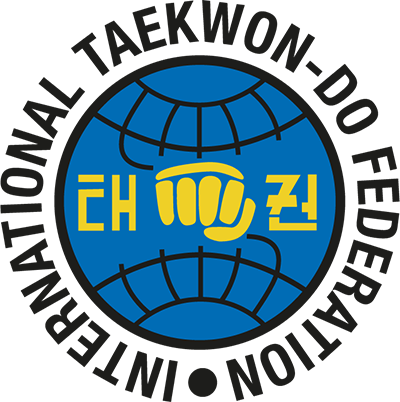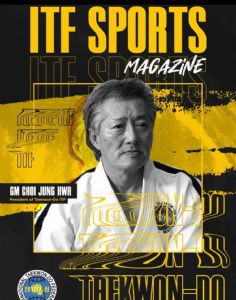| The Unit, Victoria Lane Harlington, Middlesex UB3 5EW United Kingdom |
|

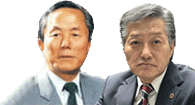
Instructor Certified?
Instructor / Examiner
In addition to a 4th degree or above cert, Instructors must have passed an IIC to grade students and apply for ITF Certification.
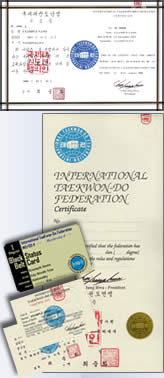
If your unsure please ask to see the Instructor's qualifications. Any reputable ITF Instructor is proud to display the above.
Organisation Certified?
ITF Clubs
If your organisation is in good standing with the ITF they will be listed on our web and have one or both of the following on display:
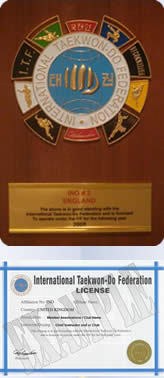
If your unsure please ask to see the Instructor's and Club's qualifications. Any reputable ITF Clubs or Instructors are proud to display the above.
ITF Constitution
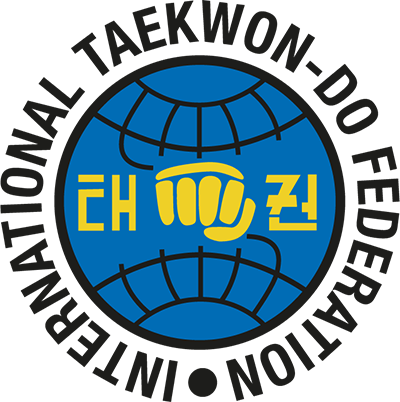
Constitution
Adopted Unanimously at the XIVth Congress on Saturday the 8th November 2002,
at Buenos Aires, Argentina.
Mission Statement
To teach the Martial Art of Taekwon-Do worldwide
regardless of race, religion and politics.
We aim to follow ethical standards while applying democratic principles
in the hope of building a more peaceful united world.
Article 1
Title, Composition and Registered Office
- The title of this organization is the “International Taekwon-Do Federation”, the abbreviation of the title is ITF.
- The legal registered office for the ITF is in London in the United Kingdom. The ITF operates in the whole of the UK and in all countries of the world where its members reside.
Article 2
Official Languages
- At all congress meetings each member may speak in his own language. Translation being made into (English, French, German, Korean and Spanish) The Korean language will be used as to technical terminology.
- The rules and regulations, minutes, reports and other communication will be in English and Korean.
- In all cases of any divergence in the interpretation of the text the English version will be accepted.
Article 3
Objects
- This organization is a not for profit corporation and will aim to achieve the following:
- To promote and encourage the physical, moral and cultural education of its member. To create international respect and goodwill. To help build a better and more peaceful world. To follow democratic principles.
- To enhance the authority and value of Taekwon-Do (“TKD”) by developing and standardizing techniques and theory, including competition rules for men and women of amateur status throughout the world.
- To establish training centres and courses to qualify “Black Belts” to be of “International TKD Instructor” status for overseas service, also “International Umpires and Examiners”.
- To conduct, manage, arrange and approve championships, tournaments and demonstrations for the world or continent.
- To assist, recognize and encourage the affiliated organizations and to furnish services and guidance to every individual, group or body for their interest.
Article 4
Means
- The objectives (Article 3) of the ITF shall be obtained by idealistic and material means.
- The required material means shall be raised by membership fees to include Independent National Organisations (INO) and individual members, accreditation material and events as deemed by the executive.
Article 5
Membership
- The aggregate membership of the ITF shall be unlimited and full membership is open to all students of TKD worldwide.
- Membership of the ITF (Individual) is available to any individual without verification of Grade, Status or affiliation. Verified membership will only be administered through an Independent National Organisation. The INO must be in good standing with the ITF in order to participate in any international events, including competitions, conferences and congress.
- For the purposes of administering national competitions, team selections for international competitions, hosting international events, or any other reason deemed necessary, the INO’s in a national territory may come together and be recognized as a National Amalgamated Organization (“NAO”). Discretion with respect to an establishing an NAO will come from the president of the ITF.
- A voting member will be a member that has the support of his/her INO.
Article 6
Application for Membership
- An application is to be submitted in writing to the Secretary General for review and acceptance by the ITF Executive Board in accordance with articles V. In special circumstances, an individual may apply directly for membership as well.
- The organization or individual will be advised by the Secretary General of admission to the ITF and if applicable, confirmation of status as an “INO”. The individuals belonging to that organization will be deemed members upon payment of the required membership fee.
- The ITF may recognize individuals or schools from other organizations on the following basis
- The organization or individual must submit an application to the Secretary General. If it is an individual, the application must be accompanied by all certificates issued from the organization the individual belongs to or is leaving. The organization must submit an application with the names of all individuals from the school with copies of certificates for each black belt student seeking recognition.
- Upon receipt of a completed application, the Secretary General will forward same to the Board of Directors for admission, determination of length of probation, if any; and any restrictions on membership.
Article 7
Termination of Membership
- The Executive may expel an Affiliated Member or INO, from the ITF by majority resolution, if such Affiliated Member or INO has violated the statuses or the interests of the ITF.
- The Executive may also expel a Member or INO because of other violations of the membership obligations.
- Termination of Membership will be by written notice from the ITF or by the ITF.
Article 8
Rights and Obligations of members
- In accordance with the statutes, the Affiliated Members are entitles to participate in all events of the ITF and to make use of its facilities.
- A voting member is selected by the affiliated members in the INO’s. Each INO must have at least one Voting Member to a maximum of two.
- All members of the INO’s, as well as affiliated members, should wear the doboks, marks and badges laid down by the ITF. In addition, each school should exhibit the certificate and the flag of the ITF at their location.
Article 9
Rights and Obligations of the ITF
- The ITF is the final arbiter on all questions concerning the resolution of the rules and regulations, competition rules and elections. They can come into being through an annual, regular general or special general meeting.
- Thirty (30) days of written notice shall be given to all INO’S of any annual meeting of members. Notice of any meeting where special business will be transacted shall contain sufficient information to permit the member to form a reasoned judgment on the decision to be taken.
- The regular general meeting, congress, will coincide with the World Championships.
- A special general meeting may take place upon written request if at least a 1/3rd of. The place of the special general meeting will be fixed by the ITF.
- A written invitation will be sent out to the members of the board of directors to regular, as well as to special, meetings 4 weeks in advance. The post stamp is enough to prove the date.
- All members of the ITF are entitled to participate in the congress. Only INO’S may give their votes.
- A quorum of the meeting of the congress will be formed when not less than 1/3rd of the affiliated organizations are present. In case one of the representatives is not available to attend the congress he or she can delegate his or her vote to another representative with the provision that it will be counted towards the quorum. Resolutions, which change the status of the ITF need 2/3rds majority of votes. Each representative can only take the vote of one other representative.
- The appointment of the representative to participate in the congress has to be confirmed by the member organizations which they represent, and has to be forwarded to the Secretary General of the ITF within two weeks (14 days) of receiving the call to attend the said meeting.
- The President, or in his absence, the Senior Vice President will take the chair at congress meetings. The Vice-Presidents will choose among themselves who will chair. If none are available to be present, then the meeting will elect one of its representatives to be Chairman.
- Should the chairman of the meeting order, or if the congress decides, then there will be a secret vote.
Article 10
Management of ITF
- The ITF shall operate through Director’s Meetings, Committee Meetings and Congress. The various committees shall be as follows:
- Board of Directors (Article XII and XIV)
- Ethics Committee
- Promotion Committee (Article XVII)
- Public Relations Committee
- Tournament and Umpire Committee
- Disciplinary Committee (Article XVII)
- Technical Committee
- Expansion Committee
- Research Committee
Article 11
Congress
- The Congress of the ITF is the final arbiter in all questions concerning competition rules and elections.
- Congress will be called to coincide with World Championships.
- A special congress meeting will take place upon written request of at least 1/3rd of those entitled to vote in the regular Congress meeting which number was as determined by the number of voting Members present at the last congress meeting. The place of the meeting will be fixed by the President to meet the convenience of the Members as far as possible.
- A written invitation has to be sent out to all Affiliated Members for Congress or a Special Congress Meeting. Said notices must be sent within a minimum of four (4) weeks’ notice in advance. The post stamp is sufficient to prove the date. Notice for meetings will be accompanied by the agenda intended to be put before the meeting, but failure to include any item will not prevent action from being valid if the chairman of the meeting permits it to be proposed without notice.
- All members of the ITF are entitled to participate in the congress. Only voting members may give their votes.
- The appointment of the voting members to participate in the congress has to be confirmed by country’s INO’S. Each country must have at least one voting member regardless of the number of members from within that country.
- The President, or in his absence, the Senior Vice President will take the chair at congress meetings. If neither is available to be present, then the meeting will elect one of its representatives to be chairman. The President or Senior Vice President may delegate the chair for a meeting to a person they select, provided said person is accepted by the Voting Members.
- Should the Chairman of the meeting order, or the congress decides, then there will be a secret vote.
- At an equality of votes the Chairman will have the casting vote. The chairman’s decision as to the result of the voting on any question shall be final. An entry into the minute book signed by the Chairman of the meeting within thirty (30) days of holding of the meeting shall be conclusive of the terms of any resolution and of its having been passed.
Article 12
Duties of the Congress
The following tasks are reserved for the Congress:
- Appointment and dismissal of the members of the board.
- Amending the statutes.
- Admission and expulsion of members, the latter notwithstanding the rights vested in the board and the President respectively, as well as disbandment of the ITF.
- Discussion and resolution about other items on the agenda.
Article 13
Board of Directors
- The Board of Directors will be composed of the President, Senior Vice President, Vice President, Secretary General, Treasurer and the Special Assistant (the “Board Members”). They will automatically become directors on their appointment by the President to the above positions.
- The President will be elected by the congress and will hold office for six (6) years.
- The board of directors may co-opt a director to fill a casual vacancy in the board but a new person so co-opted will serve only until the congress elects a new director. A special meeting of the Board of Directors is summoned at any time upon request of not less than one-third (1/3rd) of the Board Members or alternatively when the President deems it to be urgent.
- A resolution is passed if more than one-half (1/2) of the votes cast are in favour of it. The resolutions will be passed with a simple majority of votes. If votes are equally divided then the President will have the casting vote. The President will be Chairman and in his absence the Senior Vice President. If neither is present then the Secretary General.
Article 14
Duties of the Board of Directors
- The Board of Directors is responsible for the management of the ITF; it is in charge of all duties, which have not been delegated to one of the organs of the ITF according to the statutes. Its operation contains the following matters:
- Composition of the closing of accounts.
- Administration of the Federations means.
- Summoning of regular and special congress.
- Implementation of the resolutions decided by the congress.
- Disciplinary actions to members, as well as decisions for sanctions in case of breaching the statutes, and the award of certificates.
- Resolutions about the establishments of new Committees.
- Affiliation and expulsion of members .
- Ratify the international competition rules as determined by the Tournament Committee.
- Approval of place and time to perform continental competitions.
- To arrange for the management and administration of the ITF’s moveable and immovable property (freehold and leasehold), purchase materials and services, make leases and grant security for loans, make loans, and take security. All members of the ITF whether voting on such resolution or not, and all persons becoming members of the ITF, after the passing of such a resolution at a Board Meeting or Congress, shall be deemed to have assented to the resolution as if they had voted in favour of it.
- To determine and vote on remuneration/fees for work carried out for and on behalf of the ITF by its officers and members. The individual in question will be liable for any tax and insurance liability that may ensue as a consequence of such payment. The foregoing in accordance with Article XVII.
- To sanction and reimburse on behalf of the ITF all expenses reasonably arrived on its behalf by the Executive Officers and members.
- In general, the preparation of Directors Meetings.
The Board of directors may, while retaining its responsibilities, delegate the power and authority to officers and Committees and others associated within the ITF.
Article 15
Directors Meetings
- Meetings of the board of directors may be held at any time and place to be determined by the directors provided that 48 hours of written notice of such meeting shall be given, other than by mail to each director. Notice by mail shall be sent at least 14 days prior to the meeting. There shall be at least one (1) meeting per year of the board of directors. No error or omission in giving notice of any meeting of the board of directors or any adjourned meeting of the board of directors of the ITF shall invalidate such meeting or make void any proceedings taken threat any director may at any time waive notice any such meeting and may ratify, approve and confirm any or all proceedings taken or had threat. Each director is authorized to exercise one (1) vote.
- A majority of directors in office, from time to time, but no less than two directors, shall constitute a quorum for meetings of the board of directors. Any meeting of the board of directors at which a quorum is present shall be competent to exercise all or any of the authorities, powers and discretions by or under the by-laws of the ITF.
Article 16
President, Vice President, Secretary General, Treasurer and Special Assistant to the President (Officers)
- The officers of the ITF shall be a President, Vice President, Secretary General, Treasurer, Special Assistant to the President and any other officers as the board of directors may by-law determine. The same person may hold any two offices.
- Officers shall be appointed by resolution of the board of directors at the first meeting of the board of directors following an annual meeting of members.
- The officers of the Board shall hold office until a successor is appointed by the President. Officers shall be subject to removal by resolution of the board of directors at any time.
- The President directs and represents the ITF in all official matters and is ex-officio a member of all committees. The President is the only one to be authorized to sign contracts and cheques with the one exception of section 14.6; to appoint, determine and decide the terms of reference of sub committees, and to delegate such powers necessary to such sub committees. Such sub committees may have no voting rights at Board Meetings but shall make recommendations.
- The vice president will assume the duties of the President at such times as may be required by the absence or incapacity of the President. In case of permanent incapacity of the President, the vice president will retain the position of President for the elected time remaining until the next meeting of congress when an election will take place. The vice president will assume such duties as are delegated by the President.
- The Secretary General will keep a record of the meetings of the Board of Directors and Executive Committee, issue notices and perform other ordinary duties of the office or as assigned by the President or by-laws. The seal of the ITF will be held in trust by the Secretary General.
- The Treasurer will collect, and under the direction of the Board of Directors, arrange for the care and distribution of all funds of the ITF and keep full and regular accounts, which will at all times be open to the inspection of any Affiliated Member of the Board of Directors. The Treasurer will present a non-audited balance sheet monthly on the 15th day the following month to the Executive Committee and will submit to the Executive Committee a non-audited annual report within thirty (30) days after the end of each financial year.
- The ITF funds can be expended by the President, Secretary General or Treasurer.
- The Board of Directors will conduct the affairs of the ITF. It will meet prior recommendations of the Congress with regard to the affairs of the ITF.
Article 17
Committees
- The Board of Directors is responsible for the management of the ITF; it is in charge of routine business. It is in charge of all duties, which have not been delegated to one of the organs of the ITF according to the statutes.
- Standing Committees
The standing committees of the ITF whose chairmen and members will be appointed by the President, subject to the approval of the Board of Directors unless otherwise provided herein, will be as follows;- Board of Directors
- Ethics Committee
- Promotion Committee
- Public Relation Committee
- Tournament and Umpire Committee
- Disciplinary Committee
- Expansion Committee
- Technical
- Scientific Research Committee
- Ethic Committee
The ethic committee chairman will be appointed by the President. The ethic committee chairman will report to the Secretary General for final approval by the President. - Promotion Committee
The Promotion committee chairman will be appointed by the President. The Promotion Committee shall include at least seven masters. - Public Relations committee
The public relations committee chairman will be appointed by the President. The Public Relations committee chairman will report to the Secretary General for final approval by the President. - Tournament and Umpire Committee
The Tournament and Umpire committee chairman will be appointed by the President. The chairman will select other members to assist in establishing a schedule of events which will be communicated to the Secretary General for final approval by the President. - Disciplinary Committee
The chairman of the disciplinary committee shall be a member of the Legal Advisory Committee and assisted by at least one (1) member of the Masters’ committee. The chairman will be familiar with the constitution of the ITF and with principles of natural justice and ethics. Wherever possible, this person shall hold a law degree from a recognized university. The President cannot be a member of this committee. - Expansion Committee
The expansion committee chairman will be appointed by the President. The expansion committee chairman will report to the Secretary General for final approval by the President. - Technical Committee
The Technical committee chairman will be appointed by the President. The Technical committee chairman will report to the President for his approval. - Scientific Research Committee
The chairman will be appointed by the President. This committee shall be responsible for receiving and reviewing theses presented for promotion, doing research to support the teachings of Taekwon-Do and in general to promote the martial art.
- Standing Committees
Article 18
Arbitration Tribunal
- All disputes arising from the ITF relationship will be decided by the following procedure:
- The complainant Member will make a written submission to the Secretary General with a copy to the chairman of the Disciplinary Committee. The Secretary General will date stamp receipt of the complaint and forward an acknowledgement to the complainant Member, Accused Member and copy to the President and Chairman of the Disciplinary Committee.
- Within ten (10) days, the Disciplinary Committee Chairman will issue a letter to the Accused Member demanding a response to the Complaint. The Accused member must respond within twenty (20) days with a written response.
- The Chairman of the Disciplinary Committee will convene a Special Meeting of the Disciplinary Committee in person by other electronic means, to review the complaint and the response. Said meeting will take place within thirty (30) days of the receipt of response.
- The President, the complainant and the Accused will receive the decision of the Disciplinary committee. If in favour of the complainant, the accused will be removed from the ITF or ordered to comply with the terms of the decision, unless a Notice of Appeal is filed with the Secretary General within five (5) days of the decision. The Notice of Appeal must set out the reasons the decision is being appealed. The appeal will be brought before an appeal tribunal consisting of three (3) people, one being the President, with a vote, one being an impartial third party from outside the ITF and the third being an arbitrator practicing as such in the country where the head office of the ITF is located. The costs of such proceedings shall be borne by the unsuccessful party to the appeal.
- The Decision of the Appeal Tribunal is final and there is no appeal beyond this to an outside court or tribunal.
- The Disciplinary Tribunal shall have the power to order the Affiliated Member to make restitution, cease infringing on another member’s rights and expulsion. It also has the right to grant a pardon or alternatively, put the Affiliated Member on probation for a period of time.
- In the event that the complaint is against any of the Board of Directors, that matter shall be referred to the Advisory Board by the complainant. A procedure for disposing of the matter shall be established and said procedure shall be consistent with and keep in mind the principles of natural justice.
Article 19
Dissolution of the Federation
- The organization may be dissolved after the dissolution has been approved by the Board of Directors and by two-thirds (2/3rds) vote of the Affiliated Members at a special congress called for this purpose.
- Notice of a vote on dissolution has to be forwarded to affiliated members at least ninety (90) days before the vote is taken.
- The Congress will decide about the ITF means if any such exist. In special cases a liquidator may be called to decide how to distribute the means left after covering all expenses.
- The means should, if possible and allowed, be distributed to a successor organization having substantially the same or similar purposes as this ITF.
Article 20
International Competitions
- World Championships will be held every two (2) years, continental championships every two (2) years, the amateur practitioners will therefore meet in fair and equal conditions. The venue for the competition will be decided at the Congress or any other meeting providing for this item on the agenda.
- Any other International Championships then prescribed in section 20.1 will have to be approved by the ITF with the application being accompanied by the requirements of the ITF.
- Affiliated Members are not allowed to participate in international championships or competitions of any kind which are organized by non-affiliated organizations, unless approved by the ITF, which approval will not be unreasonably withheld.
- Every INO or NAO which wants to organize international championships has to submit required papers to the ITF and should obtain approval from the ITF.
- Rules for organization of International Championships will be released by the ITF by way of regulations. Umpires and judges have to be appointed by the ITF for every championship and must hold valid certification approved by the ITF.
Article 21
Execution of Documents
- Contracts, documents or any instruments in writing requiring the signature of the corporation, shall be signed by any two officers and all contracts, documents and instruments in writing so signed shall be binding upon the corporation without any further authorization or formality. The Directors shall have power from time to time by resolution to appoint an officer or officers on behalf of the corporation to sign specific contracts, documents and instruments in writing. The directors may give the corporations power of attorney to any registered dealer in securities for the purposes of the transferring of and dealing with any stocks, bonds, and other securities of the corporation. The seal of the corporation when required may be affixed to contracts, documents and instruments in writing signed as a foresaid or by any officer or officers appointed by resolution of the board of directors.
Article 22
Miscellaneous
- Any person may apply for the qualification of an International TKD Instructor who has acquired a 4th Degree or higher qualification recognized by the ITF.
- The badges and emblems of member organizations must be approved by the ITF.
- All affiliated members and especially the functionaries of the ITF shall sincerely endeavor to realize the tasks and objectives of the ITF as well as possible and in mutual agreement.
- All meetings of the ITF when face-to-face meetings are not practical can be conducted by electronic means.
- A Secretary shall record the minutes of all meetings and forward them to the Secretary General for dissemination to interested parties.
- Each affiliated member, INO, or NAO, as the case may be, agrees to be bound to any decisions made by the ITF. In the event of a dispute, all legal rights to trademarks, logos, design, intellectual property of any kind, including copyrights, are and shall remain the sole and exclusive property of the ITF.
- The INO’s and NAO’S agree to advise the ITF of any improper use of intellectual property belonging to the ITF in their respective natural territories, and where necessary, participate in the prosecution of same. All affiliated members agree that the intellectual property of the ITF represents great value to the ITF and must be protected. Monetary compensation is insufficient to compensate the ITF for damages and accordingly, the ITF may claim injunctive relief against any offending party should legal action become necessary.

 Log In
Log In